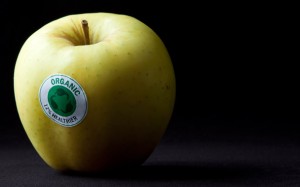Grocery store food marketing
Happy Friday everyone! I’d like to talk about the marketing tactics that companies use to sell food in grocery stores. Last night I went on a dietician led grocery store tour at the downtown Choices Market. For those of you that don’t know, Choices is a natural and organic food market, much like its competitor Whole Foods. The grocery store tour was focused on reading not only the nutrition fact label, but mainly the ingredient list. On almost every food the dietician picked up, she brought up the fact that companies have limitations and boundaries for what they can write on the product in order to market it to consumers. These limitations and boundaries aren’t slim at all. For example, a bread company can write that their bread is made with ‘wheat flour’ which is simply a twisted way of saying ‘white flour’. To most consumers, seeing the word ‘wheat’ in front of ‘flour’ immediately sounds healthier than just ‘flour’. My dietician went on to say that you know it’s healthy if it says ‘whole wheat flour’. You need the words ‘whole wheat’, not just ‘wheat’, in order for the flour to be healthier. All this twisted marketing really got me thinking about what we as consumers choose to buy, and therefore eat. Many things that we think are healthy, are in fact just marketing schemes by large companies to sell their products. Even at a health food store like Choices, there were various products that were truly unhealthy, yet they were still being sold.
This takes me to another element of skewed marketing with relation to the food we purchase in grocery stores. Many companies have jumped on the ‘organic’ trend. In other words, many products are labeled as ‘organic’ or ‘natural’ and able to be sold at higher prices than non organic foods. The Rag Blog comments on this topic (read their blog here), stating “A multi-billion dollar marketing empire has thus arisen based on the unsubstantiated theory that “pure” organic foods are by themselves an important addition to health and longevity.” Is this concept of organic being healthier really true though?
Is an organic apple any better than a non organic apple?
Well, during my dietician tour last night, the answer was that organic fruits and vegetables are no healthier than non-organic. My dietician justified her answer by stating that you’re going to wash the fruit or vegetable off anyways, so it really doesn’t matter if pesticides are used or not. I don’t know how I feel about that reasoning. I feel that if chemicals aren’t used in the creation of the food I eat, then I will be consuming less chemicals in the end. When it comes down to it, YOU are the one that decides if you are going to give into the marketing ploys that companies use to sell their products. While you walk down the aisles of the grocery store, YOU are the one that needs to decide if organic is important to you. And if it is, then doing ample research to find out if what you are buying is truly organic or made with whole wheat flour is necessary. We can’t just give in to what the flashy title on the bread package says about being all ‘natural’. Reading the ingredient label, and understanding it more importantly, seems to be the only way to really know what you are consuming. Just some food for thought..

0 comments
Kick things off by filling out the form below.
Leave a Comment